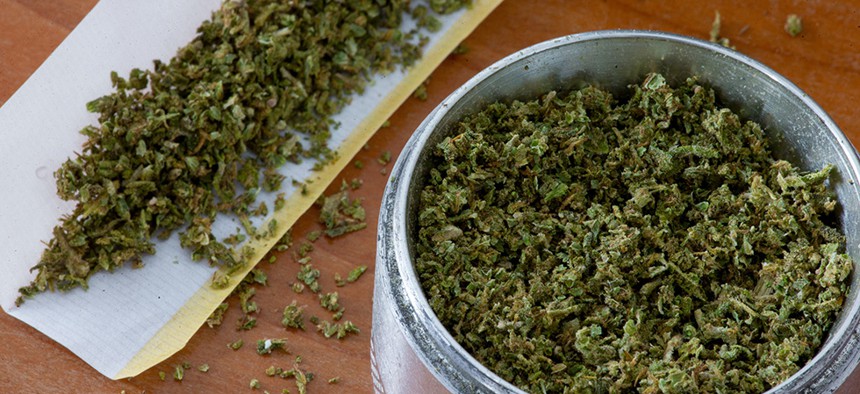Connecting state and local government leaders
Forget the handful of states that have legalized the drug. There are 566 tribes currently mulling whether to sell pot.
Thanks to a clarifying memo from the Justice Department last October, Native American tribes can now decide for themselves whether to legalize, grow, process, or sell marijuana on their lands. Which means tribes are going to be in the “same situation” as states, says Salvador Mungia, a Tacoma-based lawyer who has represented the ACLU in recent Washington state marijuana cases. Just like a state can decide whether to allow medical marijuana, recreational marijuana, or both, Indian reservations can also choose to open a pot dispensary or grow fields of legalized weed on their lands.
Even though marijuana is still illegal on the federal level, “enforcing marijuana laws [on tribal land] is not a high priority,” says Seattle lawyer Robert McVay, “as long as tribes are regulating their business.”
But what all this actually means for the nation’s 566 tribes and 310 reservations is still very much an open question. McVay’s firm, Seattle-based HarrisMoure, together with attorney Robert Odawi Porter, is hosting a conference later this month to look at the issues. It’s the first large-scale meeting, the sponsors say, to take a look at what Native Americans might do with marijuana.
Already, at least 30 tribes from 13 states have registered, says McVay.
One of the thorniest issues is what legalization would mean for a tribe located in or adjacent to a state where marijuana is illegal in every circumstance.
The Justice Department memos on the subject “do not constitute a get-out-of-jail-free card,” says Porter. “It’s an evolution, and you can’t do this on the fly.” To add to the complications, some states—Alaska, California, Minnesota, Nebraska, Oregon, and Wisconsin—have criminal jurisdiction over Indian lands.
A few members of tribes in Florida and North Dakota, states that have not approved medical nor recreational marijuana, have signed up for the conference. But, says McVay, “it’s not clear that they are attending just to see what’s going on, or because they are interested in moving forward with an operation.”
Interest is even higher among tribes in states that already have some form of legalization.
“Everyone—everyone—is talking about medical marijuana,” says Stacey Montooth, a spokeswoman for the Reno-Sparks Indian Colony, a 20-acre preserve set inside the city boundaries of Reno, Nevada, a state that allows medical marijuana.
“As far as the Reno-Sparks Indian Colony is concerned, we are always looking for economic development opportunities,” she adds. Her tribal leaders are looking into what their options might be but haven’t made any decisions yet, she says. But there’s a sense that this is an opportunity that could rival the money-making abilities of casinos.
“If every state and every tribe participated in medical marijuana, it could be a multi-billion dollar industry,” Montooth says.
Next week, a breakout session of the National Congress of American Indians’ winter executive meeting will focus on tribal marijuana policy. The session, closed to press, will include Justice Department law enforcement officials and representatives from the Bureau of Indian Affairs.
Meanwhile, one tribe in Northern California has already jumped into the growing game. The Pinoleville Pomo Nation announced plans in January tobuild a $10 million indoor marijuana cultivation facility in Mendocino County, with an eye on California’s eventual legalization of recreational pot (the state has allowed medical marijuana since 1996).
Growing hemp is another potential moneymaker for American Indians, says Amanda Reiman, a manager of marijuana policy and law at the Berkeley-based Drug Policy Alliance. Hemp, which can be grown to make fiber, paper, and oil, doesn’t have the psychoactive elements found in other forms of cannabis. “So you don’t have concerns about driving under the influence” with hemp cultivation, Reiman notes.
“I think it’s a real opportunity for tribes to get involved. Security is low and it could be a financial boom for communities.”
Still, there are plenty of complications that could arise. For instance, there’s the question of how marijuana coming from Indian lands might be taxed. “Reservations have a history of attracting business by not charging taxes” for items like cigarettes, says Jacob Sullum, an editor at Reason magazine who writes frequently about marijuana policy. “That could be an advantage for them.”
This dynamic could especially create headaches in states that have made a case to voters that revenue from taxes on marijuana could pay for various social programs, says Sullum. In both Washington and Colorado, voters were enticed by the tax revenue from legalization. “That was a big selling point—you’ve gotta tax the hell out of it,” he says. If Indian tribes are offering a cheaper alternative, “that would make it difficult for newly legal businesses to compete.”
And then there’s the elephant in the room: for some tribes, a long history of substance abuse among members might make them think twice about embracing marijuana. Porter, who is the former president of the Seneca Nation of Indians, says that some tribal governments “are worried about its impact on the citizens and its children.”
Montooth, who is a member of the Walker River Paiute Tribe in Nevada, agrees that the high rate of alcohol abuse among Native Americans, coupled with high unemployment numbers, must be taken into consideration. “It’s a very complicated matter,” she says.
One possible hint of marijuana’s future on Indian land might come from the location of the attorney-sponsored conference this month. It’s being held at the Tulalip Resort Casino in Ceda Village, Washington, a resort offering slots, game tables, eight restaurants, and shows.
(Image via GROGL/Shutterstock.com)



